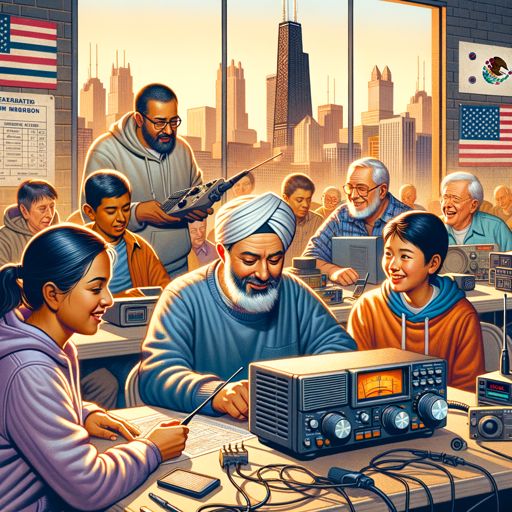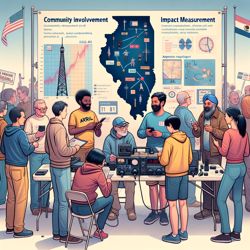ARRL Illinois Events and Opportunities
ARRL Illinois activity centers on preparedness, public service, and outreach throughout the year. The marquee weekend is Field Day, held the fourth full weekend in June. For 2025 that falls on June 28–29. Another recurring statewide exercise is the Simulated Emergency Test, typically the second full weekend in October, which in 2025 occurs October 11–12. Monthly club meetings, regional hamfests, and regular volunteer examiner sessions provide steady engagement and professional development opportunities for new and experienced operators alike.
Participation targets vary by club size and event type. Field Day draws several hundred operators across combined club efforts in the state. Large hamfests in the Chicago metropolitan region tend to attract between 500 and 2,000 attendees, depending on venue and programming. For training and licensing, many clubs report a 60 to 80 percent pass rate for students who attend an organized course and follow up with a testing session.
Field Day in Illinois: activities and preparation
Field Day remains the most visible exercise in Illinois for public exposure and emergency readiness. Typical activities include portable HF and VHF stations, digital modes, emergency power demonstrations, public demonstrations of antenna construction, and youth engagement. Preparations begin six to eight weeks out. Recommended priorities are site selection, generator and battery staging, antenna safety briefings, and RF exposure calculations consistent with FCC guidance. Public information contacts should be notified early, especially when a park permit is required. Clubs often coordinate with county emergency management agencies to demonstrate integration with local response plans.
Equipment staging requires checklists for radio inventory, power cabling, grounding, coax lengths, and spares. Safety protocols must include generator placement to prevent carbon monoxide exposure, fire extinguishers for fueling operations, and clear marking of guy lines.
Public service, emergency exercises, and volunteer roles
Volunteer radio support for marathons, community festivals, and emergency shelters is a core ARRL Illinois mission. Exercises range from scheduled public service events to sudden activation during weather events. Effective deployments use a small set of defined roles and a chain of command. Common roles include event coordinator, communications leader, station operator, logistics lead, safety officer, and public information coordinator. Training for these roles comes from regular exercises and annual drills.
Community drills also test interoperability with Illinois state and county systems. Many drills validate message handling via the National Traffic System and MARS adjuncts when applicable. Recurrent emphasis on interoperable mapping formats and ICS-213 forms reduces friction during real incidents.
- Roles commonly staffed during operations:
- Event coordinator and liaison
- Radio operator teams for HF, VHF, and digital
- Logistics and power support
- Safety and medical point of contact
Club meetings, hamfests, contests, and awards

Clubs schedule weekly or monthly meetings for technical talks, hands on workshops, and planning. Hamfests and swap meets provide face to face markets for equipment and recruit new members. Contests and operating awards motivate on air activity. Illinois operators participate in ARRL national contests, state QSO parties, and regional VHF contests. Awards like Worked All States and VHF Century Club remain popular milestones.
In the middle of the programming year, the calendar typically shows the following recurring items. This block gives a condensed view of months, activities, and planning lead times that help local planners align resources and outreach.
| Event name | Typical month | Illinois examples and targets | Planning lead time | Typical turnout |
|---|---|---|---|---|
| Field Day | June | Multi club sites across Chicago metro, central and southern Illinois | 6–8 weeks | 50–300 operators per combined site |
| Simulated Emergency Test | October | County emergency coordination exercises and shelters | 2–3 months | 20–150 participants |
| Licensing courses and VE sessions | Year round | Monthly club VE sessions using ARRL VEC process, exam fee $15 | 2–4 weeks per class | 10–60 students per cohort |
| Hamfests and swap meets | Spring to Fall | Regional gatherings in Chicagoland and central Illinois venues | 3–6 months | 200–2,000 attendees |
| Public service events | Spring to Fall | Road races, charity rides, state fair support in Springfield | 1–3 months | 10–200 volunteers |
| Special event activations | Anniversaries, holidays | Museum anniversaries, commemorative city events | 4–8 weeks | 5–50 operators |
Licensing, youth outreach, and training
Licensing classes are key to growing the community. Typical curricula follow Technician then General tracks, covering FCC rules, basic electronics, and practical station setup. VE sessions require at least three certified examiners and a $15 ARRL VEC fee per candidate. Workshops on antenna construction, digital modes such as FT8 and DMR, and emergency power systems attract both new licensees and long term operators.
Youth outreach programs link with Scouting and STEM initiatives. Successful events feature hands on radios, merit badge stations, and short operating sessions. Illinois clubs often partner with libraries and schools for demonstrations during weeklong STEM fairs. Recruiting younger members requires consistent follow up through local clubs and social channels.
Special event activations and promotion
Commemorative activations mark historical dates and local anniversaries. Promotion should combine local press releases, community calendars, and social networks. Effective posts use geotargeting and event pages on major platforms. Email newsletters and club websites remain primary archival channels. For radio publicity, coordinated announcements on local repeaters and nets drive attendance for both public and member oriented events.
Planning, safety, funding, and resources
Leaders need clear checklists for permits, insurance, and vendor coordination. Funding often comes from small sponsor donations, club treasury allocations, and modest participant fees. Sponsor recognition should be integrated into printed materials and social posts. Safety guidance includes RF exposure compliance, generator and battery handling protocols, and first aid coverage. Resources include ARRL web pages, county emergency management offices, and local public information officers for permitting advice.
Registration workflows benefit from simple online forms with waivers, capacity caps, and contact collection. For hybrid or virtual options, recording talks and providing slide decks extends reach beyond the venue.
Getting involved and measuring impact

New operators should attend a local meeting or contact a club through the ARRL Illinois channels. Volunteer roles are scalable, allowing newcomers to start with simple logistics tasks and progress to leadership. Measuring success uses attendance metrics, number of contacts logged during events, volunteer hours, and post event feedback. A standard feedback instrument on a short online form yields actionable improvements for future events.
Relevant keywords for discovery include ARRL Illinois, Field Day Illinois, hamfest Illinois, VE sessions Illinois, emcomm Illinois. Contact directories and registration links should be maintained centrally to streamline volunteer onboarding and public outreach.